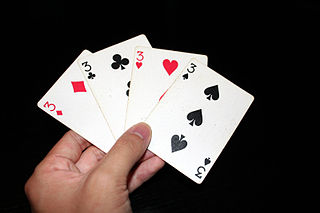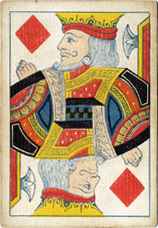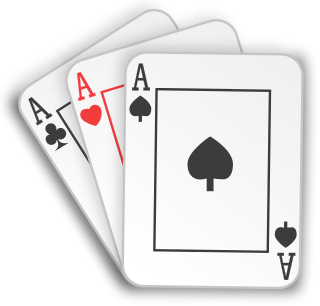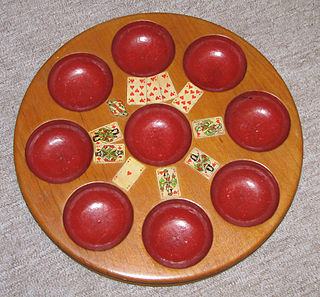
Sheepshead is an American trick-taking card game derived from Bavaria's national card game, Schafkopf. Sheepshead is most commonly played by five players, but variants exist to allow for two to eight players. There are also many other variants to the game rules, and many slang terms used with the game.

Whist is a classic English trick-taking card game which was widely played in the 18th and 19th centuries. Although the rules are simple, there is scope for strategic play.

Gin rummy, or simply gin, is a two-player card game variant of rummy. It has enjoyed widespread popularity as both a social and a gambling game, especially during the mid twentieth century, and remains today one of the most widely-played two-player card games.

Brag is an 18th century British card game, and the British national representative of the vying or "bluffing" family of gambling games. It is a descendant of the Elizabethan game of Primero and one of the several ancestors to poker, the modern version just varying in betting style and hand rankings. It has been described as the "longest-standing British representative of the Poker family."
High card by suit and low card by suit refer to assigning relative values to playing cards of equal rank based on their suit. When suit ranking is applied, the most common conventions are:

Rummy is a group of matching-card games notable for similar gameplay based on matching cards of the same rank or sequence and same suit. The basic goal in any form of rummy is to build melds which can be either sets or runs and either be first to go out or to amass more points than the opposition.

Panguingue, Tagalog Pangginggí, also known as Pan, is a 19th-century gambling card game probably of Philippine origin similar to rummy, first described in America in 1905. It used to be particularly popular in Las Vegas and other casinos in the American southwest. Its popularity has been waning, and it is now only found in a handful of casinos in California, in house games and at online poker sites. In California, it, and the low-ball version of poker, were the only games for which it was legal to play for money.

Desmoche is a popular rummy card game usually played for small stakes which closely resembles other games in the rummy family, like Conquian and gin rummy, more than poker. It was probably devised in Nicaragua in the first half of the 20th century.

Ranter Go Round is a primitive, traditional, English gambling game and children's game using playing cards that also nowadays goes under the name of Chase the Ace.

Teen patti is a gambling card game. Teen Patti originated in the Indian subcontinent and is popular throughout South Asia. It originated in the English game of three-card brag, with influences from poker. It is also called flush or flash in some areas.
Guts is a comparing card game, or family of card games, related to poker. Guts is a gambling game involving a series of deals of 2, 3, or 4 cards. Hand are ranked similarly to hands in poker. The betting during each deal is simple : all players decide whether they are "in" or "out", and announce this at the same time. Each deal has its own showdown, after which the losers match or increase the pot, which grows rapidly. A round of the game ends when only one person stays in and wins the pot.

Carioca is a Chilean card game similar to Rummy style card games with many variations. The variation described below is Perla's Cariocas.
The following is a glossary of poker terms used in the card game of poker. It supplements the glossary of card game terms. Besides the terms listed here, there are thousands of common and uncommon poker slang terms. This is not intended to be a formal dictionary; precise usage details and multiple closely related senses are omitted here in favor of concise treatment of the basics.
Stud poker is any of a number of poker variants in which each player receives a mix of face-down and face-up cards dealt in multiple betting rounds. Stud games are also typically non-positional games, meaning that the player who bets first on each round may change from round to round. The cards dealt face down to each individual player are called hole cards, which gave rise to the common English expression ace in the hole for any hidden advantage.
Draw poker is any poker variant in which each player is dealt a complete hand before the first betting round, and then develops the hand for later rounds by replacing, or "drawing", cards.

Commerce is an 18th-century gambling French card game akin to Thirty-one and perhaps ancestral to Whisky Poker and Stop the Bus. It aggregates a variety of games with the same game mechanics. Trade and Barter, the English equivalent, has the same combinations, but a different way of acquiring them. Trentuno, Trent-et-Uno, applies basically to the same method of play, but also has slightly different combinations. Its rules are recorded as early as 1769.

The following is a glossary of terms used in card games. Besides the terms listed here, there are thousands of common and uncommon slang terms. Terms in this glossary should not be game-specific, but apply to a wide range of card games. For glossaries that relate primarily to one game or family of similar games, see Game-specific glossaries.

Poch, Pochen or Pochspiel is a very old card game that is considered one of the forerunners of poker, a game that developed in America in the 19th century. An etymological relationship between the game names is also assumed. Games related to Poch are the French Glic and Nain Jaune and the English Pope Joan. Other forerunners of poker and possible relatives of the game are the English game, Brag, from the 16th century and the French Brelan and Belle, Flux et Trente-et-Un. Poch is recorded as early as 1441 in Strasbourg.

Newmarket is an English card game of the matching type for any number of players. It is a domestic gambling game, involving more chance than skill, and emerged in the 1880s as an improvement of the older game of Pope Joan. It became known in America as Stops or Boodle before developing into Michigan. In 1981, Newmarket was still the sixth most popular card game in Britain.











